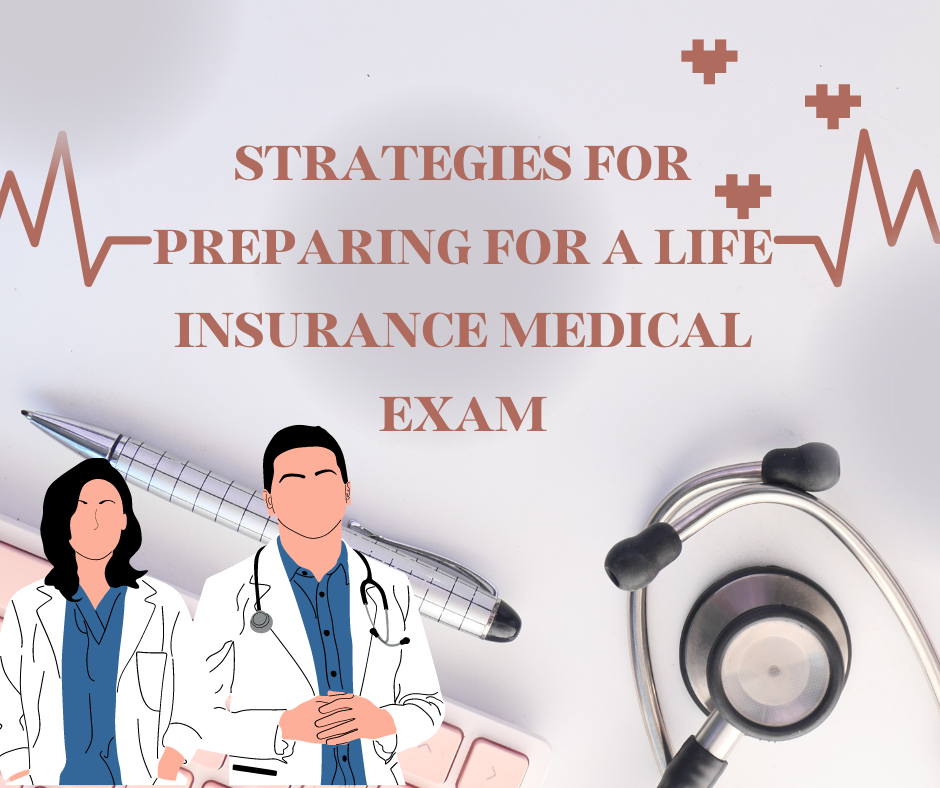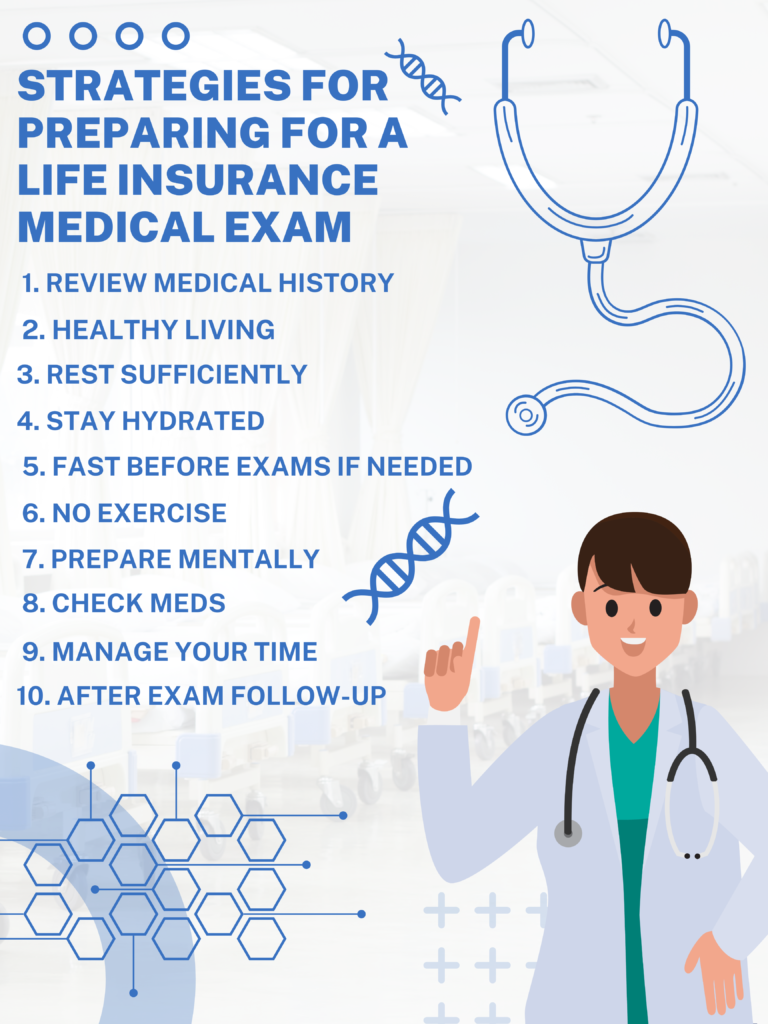Introduction

Family financial security requires life insurance. Most life insurers need medical exams before granting coverage. This exam helps insurers determine applicants’ health and risk, which impacts premiums. While a medical exam may seem scary, preparedness can increase your chances of success. Life insurance medical exam preparation is covered in this entire guide.
Understanding the Medical Exam’s Goal
Before taking a life insurance medical exam, learn why companies require it. A full health and insurer risk evaluation is the exam’s major aim. This evaluation determines premiums and coverage. Explaining the medical exam’s main parts:
1. Medical History: Examine applicants’ medical history. Insurers use this step to detect applicants’ pre-existing medical conditions and genetic predispositions. The medical history helps insurers evaluate risk and personalize coverage.
2. Vital Signs: Blood pressure, heart rate, and BMI indicate health. Vital sign anomalies may signal health issues or disease risk.
3. Medical checkups may involve lab testing on blood and urine. These tests assess medical concerns, cholesterol, and blood sugar. These biomarkers can help insurers assess applicants’ health and detect coverage issues.
4. A licensed doctor does a full physical checkup to detect any health issues. This examination may include appearance, movement, and physical abnormalities or symptoms by the medical professional. This hands-on exam gives insurers vital information and completes a health check.
Strategies for Preparing for the Exam
These methods will help you prepare for the medical exam, which is supposed to accurately assess your health:
1. Review Medical History

Examine your medical history before the life insurance medical exam. This technique involves gathering medical information from previous surgeries, illnesses, medications, and ongoing issues. Spending time gathering this information can help you provide accurate health profile insights.
Gather Relevant Documents
Get medical histories from past physicians, hospitals, and specialists. This may include operation records, hospital discharge summaries, medication lists, and imaging or diagnostic tests. Sort these papers to prevent missing anything and simplify review.
Document operations and diseases
List your surgeries and significant medical procedures with dates and locations. Explain surgical causes, outcomes, and recovery. Document serious medical conditions, including diagnosis and treatment dates.
Current drugs and conditions
List your medicines, OTCs, supplements, and vitamins. Specify drug dose, frequency, and duration. List your chronic illnesses and treatments.
2. Healthy Living
Living healthy helps you pass a life insurance medical test. Healthy habits in the weeks before the exam may improve your score. Key strategies:
1. For optimal health, eat a variety of nutrient-rich meals. Eat plenty of fruit, vegetables, lean meats, and whole grains. Vitamins, minerals, and antioxidants in these foods boost weight and health. Avoid processed, sugary, and high-fat foods, which might impair your health and medical exam results.
2. Hydration aids digestion, circulation, and temperature. Drink enough water every day to stay hydrated and remove contaminants. Excessive sugar, coffee, and alcohol can dehydrate and injure you.
3. Quitting harmful behaviors might boost your health and medical test scores. Quit or decrease smoking to improve your cardiovascular health. Reduce alcohol and recreational drug use, which can impair judgment, vital signs, and exams.
3. Rest sufficiently
Sleep is often underestimated yet essential for life insurance medical test preparation. Each night before the exam, sleep 7-9 hours uninterrupted. Quality sleep keeps you alert, focused, and attentive during the test. Why and how to get adequate sleep:
1. Controls Body Systems: Sleep controls hormones, metabolism, and immunity. Sleep rebuilds tissues, enhances immunity, and regulates hormones. Prioritizing sleep before the exam improves your health by boosting your bodily systems.
2. Improves Cognitive Function: Sleep affects brain function and performance. Sleep helps your brain process information, consolidate memories, and remove daily pollutants. Adequate sleep increases cognitive function, memory retention, and problem-solving, which can aid throughout the test. Sleep can improve attention, concentration, and medical test cognitive performance.
3. Better Health: Quality sleep lowers the chances of obesity, diabetes, and heart disease. Regular sleep promotes cardiovascular health, blood sugar management, and inflammation. Sleeping well before the test can enhance your health and lower the risk of health concerns that could affect the findings.
4. Stay Hydrated
Hydration before a life insurance medical exam may alter lab results and physical function. Prepare for the exam by drinking lots of water. Balance eating before the exam to avoid distractions. Why and how to remain hydrated during the exam:
1. Optimises Body Function: Hydration controls body temperature, promotes digestion and delivers nutrients and oxygen to cells. Hydration optimizes bodily functions, ensuring accurate test results and overall health.
2. Hydration is necessary for accurate blood testing. Dehydration alters blood volume and concentration, skewing tests. Pre-exam hydration helps lab tests generate reliable health evaluations.
5. Fast before exams if needed
Some life insurance companies require fasting before checking blood glucose or lipids. Fasting guarantees reliable test results and data. Read about fasting before the exam and following your insurer’s advice:
1. Understanding Fasting: Fasting before lab tests removes recent food consumption effects, assuring test findings reflect your baseline health.
2. Following specific directions: If your insurance mandates fasting for medical checkup lab tests, do so. Test type and insurance requirements may influence instructions. Follow fasting rules for length and time.
6. No Exercise
Before a life insurance medical exam, consider how exercise affects your health. Exercise is beneficial, but before the exam, watch your intensity and timing. How to manage your workout routine and why you should avoid excessive physical activity before the exam:
1. Vital Signs: Exercise momentarily boosts heart rate, blood pressure, and breathing. Although normal during exercise, these changes may influence your medical exam and misrepresent your health. Avoid heavy workouts before the exam for accurate vitals.
2. If you’re not used to intense workouts, they can hurt, fatigue, and injure you. Sore muscles or injuries may limit exam mobility and performance, resulting in unsatisfactory results. Avoid stressful activities before the exam to lower the risk.
3. Minimise strenuous activities before the exam. Brisk walking, cycling, swimming, and yoga are stress-free ways to keep fit. These exercises boost circulation, stress, and wellness, making them ideal pre-exam workouts.
7. Prepare mentally
Life insurance medical tests can cause stress and concern. To prepare mentally and emotionally for the exam, you must regulate these feelings. Reduce nervousness and stay focused throughout the exam with these tips:
1. Use deep breathing, meditation, and visualization every day to calm nerves and reduce anxiety. Through deep breathing, you may relax. Meditation and imagery can calm you.
2. Focus on the Present: Don’t worry about the future, focus on the exam and preparation. Divide planning into little tasks and do them individually. Being mindful will reduce exam anxiety and relax you.
3. Remember: You’ve prepared for the test by reviewing your medical history, eating healthily, and following your insurer’s requirements. Trust in your health and well-being efforts and remember that you prepared adequately.
8. Check Meds

Check your medications before a life insurance exam. This is important since some medicines might change vital signs or lab test results, changing the exam. A comprehensive pre-exam medicine plan:
1. List your prescriptions in detail. Include the name, dose (milligrams or micrograms), and frequency (once or twice a day) of each drug. Test reference lists should be brief and easy to understand.
2. Know Vital Signs: Drugs can influence blood pressure, heart rate, and breathing. Beta-blockers lower heart rate, and stimulants elevate BP. Be aware of how each medicine may influence your vital signs before test modifications.
9. Manage Your Time
Your life insurance medical test might be less stressful if you plan beforehand. How to arrange to be on time and prepared:
1. Allow More Travel Time: Allow extra time for traffic, parking, and other delays when traveling to the test place. Take traffic and alternative routes into account. Arrive early and start the exam quietly to prevent delays.
2. Preparation Time: Spend time on documentation and pre-exam preparation before the start. This may involve completing forms, providing identification, or resolving last-minute difficulties with the examiner. Coming early enables you to accomplish these tasks stress-free.
10. After Exam Follow-Up
Being informed of the application process following your life insurance medical test is vital. Proper follow-up requires:
1. contact your insurance agent or underwriter. Your insurance agent or underwriting team can update you on your application and any additional requirements. When will you obtain exam results and underwriting decisions?
2. Ask Next Steps: Ask your insurance agent or underwriter about the application’s next steps. Ask for underwriting paper requirements. Clarify the application schedule and requirements.
3. Study Exam Results and Underwriting Options: Exam results and underwriting choices should be carefully examined. Note how exam results may affect your insurance coverage or rates. Ask your insurance agent or underwriting team about exam results or underwriting options.
4. Ask questions about exam results, underwriting, or the application process. Your insurance agent or underwriter can address problems. Proactively promote yourself and understand the stages.
Conclusion
Life insurance medical tests need careful preparation and attention to detail, but they’re crucial to family financial stability. Strategic exam preparation can boost your chances of passing and qualify you for better coverage and premiums. The exam is supposed to objectively assess your health, so live a healthy lifestyle and share problems with your doctor or insurance agent. With proper planning and a positive mindset, you may apply for life insurance and feel assured about your family’s financial security.


Hey Students!
Summer semester’s almost here! Get a head start and grab all your eTextbooks (over 15,000 titles in convenient PDF format!) at Cheapest Book Store. Save BIG on your studies with 20% off using code SUMMERVIBE24.
Still missing a book? No problem! Submit a request through our system and we’ll add it to our collection within 30 minutes. That’s right, you won’t be left scrambling for materials! ⏱️
Don’t wait – visit https://m.cheapestbookstore.com today and ace your summer semester!
Happy Learning!
Cheapest Book Store